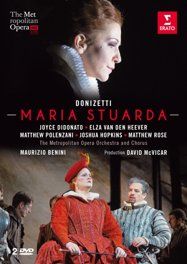Interview,
Joyce DiDonato on Maria Stuarda
 Fresh from her triumphant final performance of Rossini's La Cenerentola at the Metropolitan Opera on Saturday night, the great American mezzo discusses one of her newest roles: Donizetti's Maria Stuarda, which she will sing in London in July in a production by Moshe Leiser and Patrice Caurier. Her debut in the role, in Sir David McVicar's production from the Met in early 2013, was broadcast into cinemas worldwide and is now available on DVD from Erato.
Fresh from her triumphant final performance of Rossini's La Cenerentola at the Metropolitan Opera on Saturday night, the great American mezzo discusses one of her newest roles: Donizetti's Maria Stuarda, which she will sing in London in July in a production by Moshe Leiser and Patrice Caurier. Her debut in the role, in Sir David McVicar's production from the Met in early 2013, was broadcast into cinemas worldwide and is now available on DVD from Erato.
You've previously sung the role of Maria's antagonist, Elisabetta - did this create any special insights (or obstacles!) when you came to take on the title-role?
The biggest insight it gave me in preparing the role of Mary (in particular, for the famous confrontation scene) is that both Queens knew in their hearts that they were right, and they both FIERCELY would defend their beliefs to the death. This was crucial to me in terms of the confrontation, because Mary is not hurling senseless, debasing insults at Elizabeth just to be defiant, she is speaking her truth from the very core of her being. I believe it is the only way to possibly play that scene and keep the dramatic tension.
The role of Maria (and indeed that of Elisabetta) has been sung by quite a variety of voice-types (coloratura sopranos and big lyric sopranos as well as agile mezzos): are you using the same version of the score as, say, Montserrat Caballe, or does it involve transpositions and switches in the ensembles?
I’m using the score as prepared by Sir Charles Mackerras for Dame Janet Baker. They found a wonderful way to tailor the role for her rich voice, and I found that it was a very good fit for me, as well. Considering that this was a practice widely accepted in Donizetti’s day, as well as how much of a mark Dame Janet made on the role, I didn’t hesitate to follow in her footsteps.
Tell us a little about your collaboration with Sir David McVicar on this fascinating character: how rooted in historical research was it, and what particularly aspects of Maria did you choose to bring out?
I have never worked with a stage director who came to the first day of rehearsal with a more encyclopedic knowledge of a historical period. This historical period is in Sir David’s blood, and it is something [he] approaches with profound respect and passion. It was a thrilling collaboration, because we were both invested in the TRUTH of these characters and their story - the historical truth, but also the truth that Donizetti sought to bring to his version of this woman’s life.
Like most of us, you're known to be a great fan of Dame Janet Baker (and she of you!): how much did she inform your approach to singing Maria, either through recordings or more directly?
I must be honest - I could not study her portrayal too deeply, other than to listen to her recording and watch certain excerpts once through. It may sound contradictory, but I have entirely too much respect for her and her artistry to risk imitating her in any way. I can be an unconscious chameleon and will adapt certain characteristics of other performers without being aware of it. It is important for me to go directly to the source (the librettist and composer) and to find my interpretation directly through them without filters.
The greatest way, however, that she informed my assumption of the role was in her exacting, uncompromising approach to her pursuit of TRUTH in a character, as well as how much she obviously loved this woman. She helped me to dare to make Mary HUMAN and not a revered icon that could not be portrayed as REAL. This was a great gift that Dame Janet bestowed to me (and any other singer who will perform this role.) Yet this is what she did with every single thing she ever performed. What a legacy and a gift she has given to the world.
Much of your career to date has focused on baroque roles rather than the bel canto repertoire - how different are the vocal and dramatic challenges, and can we expect to see more of this repertoire in your future?
I don’t change my vocal technique in the least when I cross genres. I also have spent more time singing Rossini than Handel, so I find that all of these Italian Composers work hand in hand with the voice and offer you the chance to continue to refine your technique and bel canto mastery. I will always return to this repertoire, as it really is the core of my career.
Sir David McVicar's production of Maria Stuarda, starring Joyce DiDonato in the title role, is out now on Erato. Elza van den Heever sings Mary's nemesis Elizabeth I, with Matthew Polenzani as Leicester, and Maurizio Benini conducting the orchestra and chorus of the Metropolitan Opera.
Available Format: 2 DVD Videos



